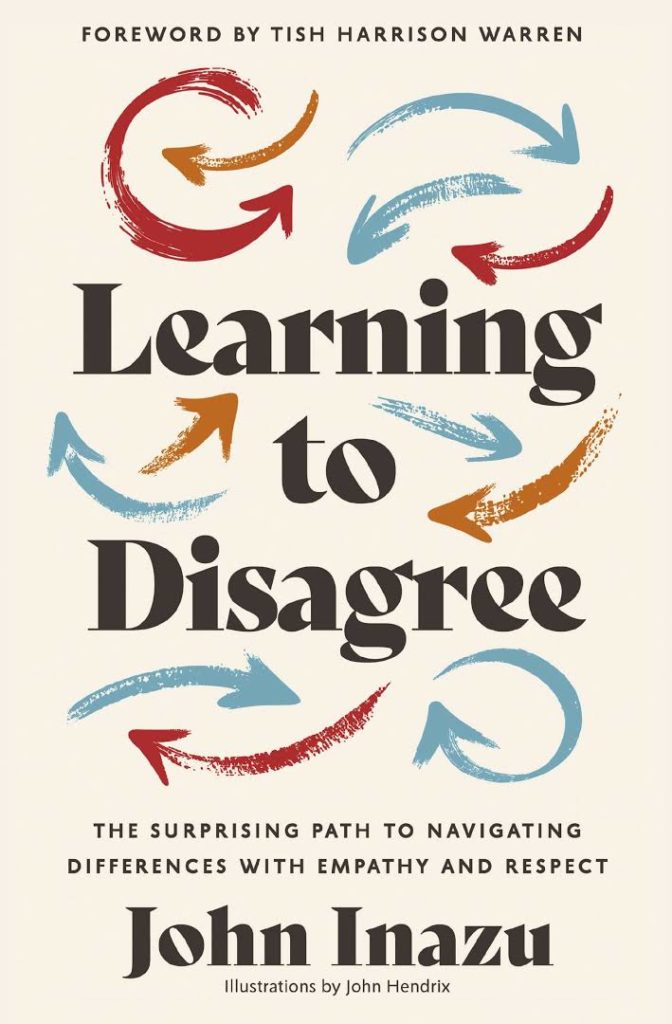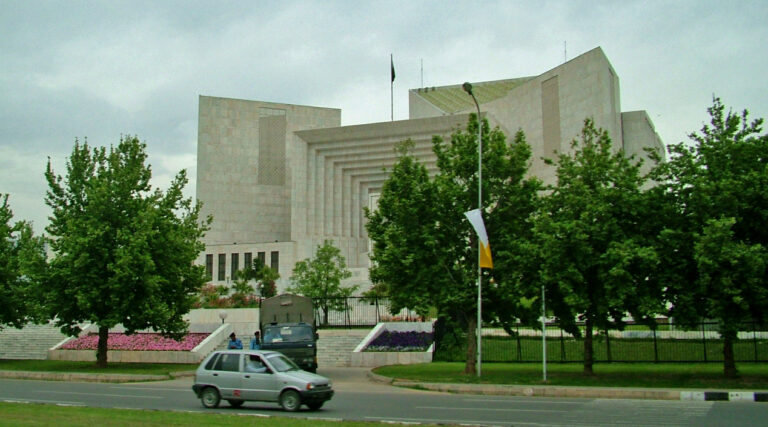
Learning to Disagree
John Inazu
The following is an introduction followed by an adapted excerpt from John Inazu’s new book, “Learning to Disagree” with permission from Zondervan Publishing, 2024.
In past academic work, I have explored the tensions and instability that surround theories of pluralism, the right of assembly, and the religion clauses. Alongside these scholarly inquiries, I have routinely taught criminal law, law and religion, and various First Amendment seminars. Somewhere along the way, it occurred to me that my scholarly and teaching interests merged at the intersection of important questions not only about disagreement but also about vexing normative claims: what is the nature of a human being;, what are the limits of permissible belief and conduct;, how do we know what it means to pursue good in this world? Many of these questions fall more in the domain of philosophers and theologians than law professors. But in my everyday teaching and writing, these questions—and our starkly different answers to them—were unavoidable.

Learning to Disagree shows how law and legal education help us navigate our disagreements around these deeper questions. It is written for a broad set of readers, some of whom are or will be lawyers but many of whom are not. Law, in other words, has something to teach all of us about how we disagree with neighbors, coworkers, and even family. The stories I share raise fundamental human inquiries, like searching for empathy in uncertainty, struggling to discern what’s fair, and asking what happens when compromise isn’t possible.
This book isn’t just about law. It’s about holding in tension clarity and ambiguity, tolerance and judgment, confidence and uncertainty. It’s about what each of us faces in our daily encounters with others who differ from us.
The topic of law and religion illustrates these stakes and the manner in which they unfold particularly well. Everyone has some skin in the game when it comes to law and religion. For some people, it’s more traditional religious faith; for others, it’s faith in an ideology or faith in themselves. But everyone has faith in something—we all choose a path that rules out other possibilities and implicitly stakes our lives on one faith claim or another. The study and teaching of law and religion is an extended experiment in navigating the legal, cultural, and personal implications of living in a world of these competing faith claims. The excerpt below takes the reader into my law and religion class to see how we might navigate the resulting tensions and work toward better disagreement.
[A] few days later [we turn to] Masterpiece Cakeshop v. Colorado Civil Rights Commission. This is the case about the guy who does not want to bake a cake for a gay couple’s wedding. This case frustrates me for two reasons. The first is that I have rarely encountered public commentary that musters an ounce of empathy for the other side. People who think the guy should bake the cake can’t fathom that his religious objection might actually be sincere. And people who think the guy should not have to bake the cake can’t see that the gay couple might actually have experienced emotional harm from the denial. I am generalizing a bit, but if you look back at the media coverage as the case was being litigated, it is hard to find much nuance.
The second reason that Masterpiece Cakeshop frustrates me is that the Supreme Court tells us almost nothing useful. Instead of a constitutional analysis, Justice Kennedy gives us a great deal of . . . Justice Kennedy’s views: Gay people are nice. Religious people are nice. The Colorado officials who first decided this case were not nice. Everyone should be nice to each other and respect each other’s dignity.
I am not kidding—go read the opinion if you don’t believe me. And it’s not that I don’t want people to be nice to each other. But “Be nice” doesn’t usually translate into constitutional doctrine. And in place of guidelines for lower courts and policymakers, we get some Justice Kennedy-isms. Here’s one:
If that exception [for clergy] were not confined, then a long list of persons who provide goods and services for marriages and weddings might refuse to do so for gay persons, thus resulting in a community-wide stigma inconsistent with the history and dynamics of civil rights laws that ensure equal access to goods, services, and public accommodations.
Well, I don’t want gay people facing “community-wide stigma.” But it’s not clear to me how a guy refusing to bake a cake in Denver could lead to that result. It turns out that in Masterpiece Cakeshop, the gay couple found a bakery down the street that would bake their cake for free. And while Denver isn’t Berkeley or San Francisco, it is progressive enough that a gay couple facing a wall of exclusion for their wedding seems highly unlikely.
I wish Justice Kennedy had paid more attention to contextual differences and situations where the possibility of community-wide stigma is not a hypothetical. Take a small rural town in the South with one bakery. The gay couple denied a wedding cake in that town might well have no other options. And in that small town, it’s possible that the florist and the local bed-and-breakfast might also object to the wedding. All of that starts to feel a lot like “community-wide stigma” that prevents the couple from “equal access to goods, services, and public accommodations.”
What do we do in that situation? The religious beliefs of the rural baker may be just as sincere as those of the Denver baker, but the surrounding context is quite different. The strongest proponents of religious freedom would say the differences in my small-town hypothetical shouldn’t matter and the religious claimant should always prevail.
I ask my students what they think, and the question leads to a discussion about various rights and harms.
Kirk Rhodes, a third-year student from Atlanta, suggests that sometimes religious freedom claims should lose to antidiscrimination laws.
Olivia Kingston, a second year from St. Paul, isn’t sure where to draw the line. She notes that the First Amendment singles out religion for special protection, which might make a religious baker different from a nonreligious baker.
“But what about all of the people arguing that the baker’s cake is art?” asks Kirk. “If art is speech and artistic speech always wins, then couldn’t anyone refuse to bake a cake for anyone else? How do we draw a line?”
Olivia pushes back on Kirk: “That’s a hard question, but it’s not the question the Court decided in this case. This case was about the free exercise of religion.”
Our discussion is far better than what I remember of the media coverage and dueling op-eds surrounding the case when Justice Kennedy sided with the cake baker. Or, for that matter, the public commentary surrounding a host of other legal clashes between progressives and religious conservatives over gay marriage and related issues. There was the case about the Catholic adoption agency in Philadelphia that did not want to place kids with same-sex couples. Then there was the website designer who did not want to make a website for gay weddings. And along the way, the 2022 Respect for Marriage Act recognized gay marriage at the federal level and acknowledged that religious freedom means that people can hold different views about the morality of gay marriage.
In some ways, the Respect for Marriage Act represents the kind of political compromise that works even though neither extreme really likes it. On the one hand, it codifies legal protection for same-sex marriage (which most people support) and interracial marriage (which almost everyone supports). On the other hand, it recognizes that “reasonable and sincere people” hold diverse beliefs about marriage based on “decent and honorable religious or philosophical premises.”
The extreme conservatives don’t like this law because they want a country that bans same-sex marriage. The extreme progressives don’t like the law because they want a country where everyone whose religious beliefs don’t support same-sex marriage is deemed a hateful bigot. The Respect for Marriage Act pushes back on both extremes and says that neither being in a same-sex marriage nor expressing religious opposition to same-sex marriage is evil. It suggests that when it comes to this issue, we can still live in a world where we view each other as wrong—even deeply wrong—without crossing the line to evil. I suppose this looks a lot like Justice Kennedy’s Masterpiece Cakeshop opinion after all. But the source of authority matters. A one-judge philosophy of who counts as “nice” isn’t going to hold this country together. Bipartisan legislation reinforced with coalitions built across the aisle has a chance of rooting policy interests in the lives of actual human beings, most of whom don’t view each other as fundamentally evil but who could use a few reminders of why that is the case. . . .
In a country as large and diverse as the United States, every one of us holds beliefs and opinions that other people think are beyond the pale. I suppose we could just run around calling each other evil, but that would either heighten tensions or diminish the value of the word. Perhaps it is better to start with the presumption that most people can be wrong—even deeply wrong—without being evil.
One practical way to embrace this presumption is to look for something good about the people you find most wrong. Start with the political leaders you don’t like. Try to name one thing they do well, one group of people whose lives they have improved, one way they have contributed to your understanding of human flourishing. Make this a personal effort in the silence of your mind rather than a performative gesture on social media. And if you can’t come up with anything, ask yourself if it’s because they need to change or because you need to change. ♦

John Inazu is the Sally D. Danforth Distinguished Professor of Law and Religion at Washington University in St. Louis. His next book, Learning to Disagree: The Surprising Path to Navigating Differences with Empathy and Respect, will be published by Zondervan in 2024. Inazu is also the founder of The Carver Project and the Legal Vocation Fellowship and a Senior Fellow with Interfaith America, where he co-directs the Newbigin Fellows. Headshot is courtesy of Joe Angeles / WashU.
Recommended Citation
Inazu, John. “Learning to Disagree.” Canopy Forum, March 28, 2024. https://canopyforum.org/2024/03/28/learning-to-disagree/.
Recent Posts










